2014 marks the 60th year since Japan started international cooperation through official development assistance. A commemorative symposium entitled “Growth and Poverty Reduction – The Role of Japan’s ODA” was held on Nov. 17 in Tokyo, co-hosted by the Ministry of Foreign Affairs of Japan and JICA.
At the symposium, Minister for Foreign Affairs Fumio Kishida and Helen Clark, administrator of the United Nations Development Programme (UNDP), gave keynote speeches. Parliamentary Vice-Minister for Foreign Affairs Kazuyuki Nakane filled in for Kishida by reading Kishida's speech.
That was followed by a panel discussion, in which Albert F. del Rosario, secretary of Foreign Affairs of the Republic of the Philippines; Michael Kamau, cabinet secretary of the Kenyan Ministry of Transport and Infrastructure; Akihiko Tanaka, president of JICA; and John Page, senior fellow, Global Economy and Development, the Brookings Institution, served as panelists. In addition to the discussion, there was a Q&A session. Aiko Doden, senior commentator of Japan Broadcasting Corporation (NHK), moderated.
Role of ODA changes with the times
After the welcome remark, Nakane read a speech for Kishida based on the theme “Development Cooperation in a New Era -What Japan, a Contributor to Peace, Aims For-.” The Ministry of Foreign Affairs announced it would revise the ODA Charter in March and is in the review process of that effort.
“Over the past 60 years, what Japan has put the greatest emphasis on with regard to ODA has not been to give unilateral ‘assistance’ to developing countries but to extend ‘cooperation’, which encourages self-help efforts and self-reliant development by and for developing countries and their people by meeting with them eye-to-eye and toiling together.”
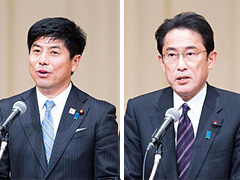
Parliamentary Vice-Minister for Foreign Affairs Kazuyuki Nakane, left, gives a speech on behalf of Minister for Foreign Affairs Fumio Kishida, right, who also gave a speech.
He went on to say that as illustrated by the fact that the private flows entering into developing countries exceed the ODA amount, the role of ODA has changed. “It is important for future ODA to continue to play the role of a catalyst to attract private sector investments and, in the end, a catalyst to link these investments with ‘Quality Growth’,” he said.
Kishida appeared and emphasized the significance of the review of the ODA Charter, by saying that though he is proud that the Japanese ODA has played a considerable role, Japan, as well as the circumstances surrounding Japan, have been changing greatly. ODA should advance in line with the change and respond to expectations from within and outside Japan. He continued to confirm that the new Charter will show the existence of development assistance of the type Japan, a contributor to peace aims for, and Japan's resolve.
Fruits of growth to all people
Next, Clark gave a speech entitled “Role of ODA and Post-2015 Development Agenda” Jointly with UNDP, Japan has worked to resolve various development agenda items toward achievement of the Millennium Development Goals (MDGs, 1) established in 2000.
“We see quality, reach and focus of Japan’s ODA being very important driver of development at the global level and for many countries. Also, Japan’s strong commitment to action in the areas from poverty reduction, to health, education and agriculture are all playing very important role and driving a global achievement on the MDGs,” Clark said, praising the efforts of Japan.
While many people managed to escape from poverty through the achievement of MDG agenda items, there still remain many who are left out from development. Clark pointed out the importance of people-centered development and said that in order to make the post-2015 Development Agenda (2) universal and applicable to all countries and regions, an even more drastic and innovative action plan is required, and to eradicate poverty and distribute the fruits of growth to all people, the quality of assistance becomes important. For that, she confirmed that UNDP would like to continue its partnership with Japan in the future, in an effort to resolve development issues.
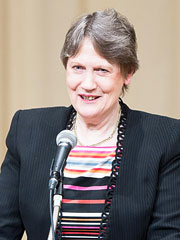
The United Nations Development Programme Administrator Helen Clark highly evaluates joint projects by Japan and UNDP.
Looking back on 60 years of international cooperation
In the second session, a panel discussion entitled “60 years of Japan’s ODA and its future” was held, moderated by Doden.
JICA President Akihiko Tanaka regarded the 60-year history of international cooperation as the history of post-war connection between Japan and the international community, and looked back on how international cooperation has developed. The history of Japanese international cooperation can roughly be divided into three eras. The first era is from the mid-1950s to the mid-1970s, when Japan, along with postwar reparations, started to provide assistance, and became a responsible member of the international community. The second era spans from the mid-1970s to the mid-1990s when Japan grew to become a major economic power, increased its international cooperation and built Japanese-style ODA, and the third began in the 1990s, when Japan developed its novel Japanese-style international cooperation as the cold war was ending, and economics were becoming globalized.
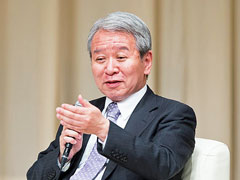
JICA President Akihiko Tanaka emphasizes that ”People-to-people connection is a basis for international cooperation.”
“During the first and the second era, infrastructure development and agricultural assistance were the mainstream, and sectors related to human security such as health and hygiene, education and peace-building now have a higher proportion. Further, the importance of technical cooperation with such Japanese brands as One Village, One Product, maternal and child health handbook, Kaizen and 5S, is increasing. These transitions indicate that the characteristics of Japan’s international cooperation are about respecting the ownership and self-help efforts of development partners, emphasizing people-to-people connections, and reducing poverty through economic growth. In addition, the important thing is to provide assistance from the development partners’ perspective, rather than applying Japanese skills and experiences as they are,” Tanaka said.
Expecting Japanese assistance in science and technology fields
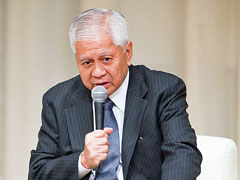
Albert F. del Rosario, secretary of Foreign Affairs of the Republic of the Philippines, says the partnership with Japan should be “more innovative.”
Albert F. del Rosario, secretary of Foreign Affairs of the Republic of the Philippines, touched on the long years of partnership between Japan and the Philippines. For the Philippines, Japan is the only country to conclude a bilateral economic partnership, and it is the biggest trade partner.
“Japanese assistance is of a very high quality. It has kept continuous support while adhering to the principle of respecting the recipient’s self-help efforts and initiative. Our county has gained the ability of fighting against climate change and natural disasters with the help of Japan,” he said.
Also, he said assistance in capacity development in the fields of science and technology can be expected in future ODA from Japan.
“What we need in the process of regional integration in Southeast Asia is international competitiveness. For that, we are eager to seek for assistance in capacity building for engineers and researchers especially in the field of science and technology.”
Assistance sought in technology development and upskilling in capacity building
Michael Kamau, cabinet secretary of the Ministry of Transport and Infrastructure of the Republic of Kenya, looked back what the past Japanese ODA brought to Africa.
“The Japanese ODA has motivated the governments in African countries that they can achieve growth and now Japan, became a role model for other countries and organizations. In the future, we hope to receive upskilling-focused assistance such as technology development and capacity development,” he said.
He also mentioned infrastructure development in roads and bridges as an outcome of Tokyo International Conference on African Development (TICAD), held five times from 1993 to 2013 under the initiative of Japan.
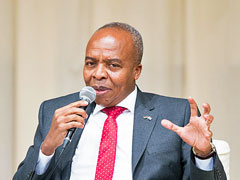
“Infrastructure development is critical also to establish security,” says Michael Kamau, cabinet secretary of Ministry of Transport and Infrastructure of the Republic of Kenya.
“Our neighboring countries Uganda and Tanzania are the biggest trade partners for Kenya. With the development of transport aortas connecting country to country, and cities and suburbs, economic activities as well as access to medical care and education have improved. Achieving stability and prospects not only in a country but also in its neighboring counties is linked to peace and stability in all of Africa.”
Japanese assistance that 'believes' recipient countries
John Page, senior fellow, Global Economy and Development, the Brookings Institution, analyzed what is required to apply Japan’s experience in Asia to Africa. While Africa maintains its annual GDP growth rate of 5 percent, reduction in poverty and creating new jobs are behind those of Asia.
“It shows that a success model in Asia cannot be applied to Africa as it is. For development assistance in Africa, we need to understand that the structures of Africa and Asia are different,” he said.
He added that an element required for development in Africa is for the people in those countries to have strategies, skills and knowledge.
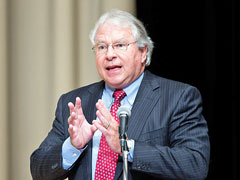
John Page, senior fellow, Global Economy and Development, the Brookings Institution, points out that “Poverty reduction in Africa is not catching up to its economic growth.”
“These are exactly the strong points of Japanese international cooperation. In other words it’s to ‘believe the country.’ Though there may have been failed cases, Japan has focused on the recipients’ self-help efforts and trusted the country from the beginning of the international cooperation. Also, JICA has excellent know-how for management and training of small and medium-sized enterprises. I expect Japan to become a leader of assistance for Africa” he said.
Panelists answer questions on international cooperation
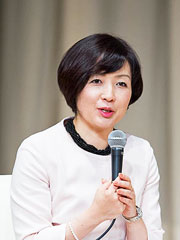
Aiko Doden, senior commentator, Japan Broadcasting Corporation (NHK), acts as a moderator.
After that, panelists answered questions from the audience.
In response to the comment, “Japan’s ODA slants toward assistance in infrastructure,” Tanaka said, “It may look true for yen loan projects, but technical cooperation and grant aid involve many other forms of assistance. However, I’d ask your kind understanding that for many developing countries, infrastructure development is the basis of economic growth, and at the same time the infrastructure is also significantly important to improve access to health and education.”
To the question “Is a yen loan beneficial to the recipient country?” Kamau, the Kenyan cabinet secretary of Ministry of Transport and Infrastructure, replied by explaining the benefits.
“Mombasa airport in Kenya was able to proceed with its improvement project, thanks to assistance from Japan. For Kenya, with scarce connectivity to regional areas, infrastructure development is a critical agenda item also for education and medical care,” he said.
Regarding his views on BOP business (3) and the roles expected of Japan, Page said, “According to the World Bank’s estimate, it will cost 93 billion dollars yearly to improve infrastructure in Africa. To achieve it and close the infrastructure gap between Africa and the rest of the world, we need creative ideas, and that’s where BOP business has potential.”
Tanaka added, “ODA funds are limited. To advance infrastructure development, the use of knowledge and funds by private enterprises through the BOP business is necessary.”
To answer the question, “What can students do for international cooperation?”, panelists replied with hopes for younger generation’s active participation.
“There are various options including the Japan Overseas Cooperation Volunteers and internships in universities. To have interest in difficult issues the world is facing, such as eradication of poverty, conflict resolution and preventing infectious diseases, would also be the first step toward the international cooperation,” said Tanaka.
“First of all, study hard. Show interest in the history of developing countries, learn, and have discussions among students. Then, as the next step, I would like you to actually visit developing countries,” said Page.
“Start with an interest in Africa. I would like you to know about it. Without being bound by stereotyped ideas, I hope you use your own eyes to see it and deepen your understanding,” said Kamau.
Doden gave closing remarks:
“In the past 60 years the world’s power balance has changed, and so has the idea of what assistance should be. To think about the existence of international cooperation on the milestone of the 60th year is to consider how Japan should be engaged in the international community. I think the discussions today were very productive to deepen the debate.”
Notes:
- 1 . Eight development goals the international community aims to achieve by 2015.
- 2 . A framework of MDGs after 2015.
- 3 . A type of business expected to contribute to resolving various issues in the lower-income range of developing countries.
- Symposium commemorating the 60th anniversary of Japan’s ODA “Growth and Poverty Reduction – The Role of Japan’s ODA” (part 1, external link)
- Symposium commemorating the 60th anniversary of Japan’s ODA “Growth and Poverty Reduction – The Role of Japan’s ODA” (part 2, external link)
- Keynote Speech by Foreign Minister Fumio Kishida at the Open Symposium Commemorating the 60th Anniversary of Japan's ODA (external link)
- Japan’s ODA (external link)




scroll